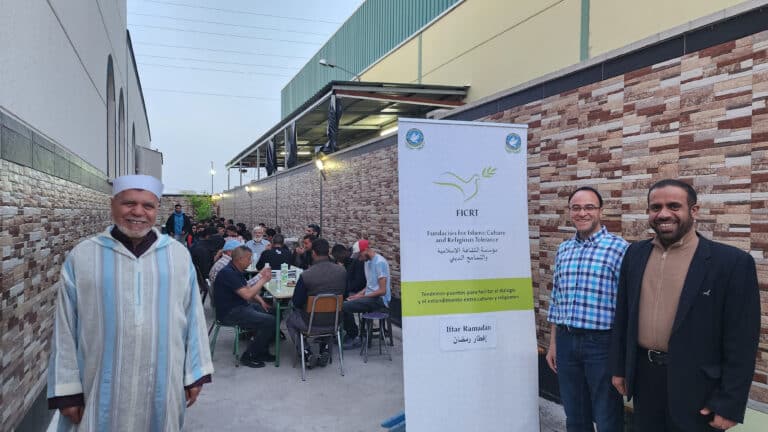The FICRT Foundation’s First Cordoba Forum’s second session was dedicated to highlighting the common points that unite the major religions and featured three speakers who delved into these issues from the perspectives of Islam, Christianity, and Buddhism. This session was moderated by Dr. Francisco Javier Fernández Vallina, professor of Hebrew and Aramaic Studies at the Complutense University of Madrid.
Dr. Emilio González Ferrín, professor of Islamology and Arab Studies at the University of Seville, was the first speaker in this second session. Dr. González Ferrín explained the various models of interpretation that exist in contemporary Islamology and chose the third one: the historical-critical method, which performs a coherent scientific reading of the Coranic text and Islamic sciences literature.
The speaker distinguished between Islam’s religion (which should be written in lower case), Islam’s civilization (which should be written in capital letters), and contemporary Muslim societies. All three share the ethic of people’s liberation.
“From the eighth to the fifteenth centuries, Islamic culture was the guardian civilization in the preservation of arts, letters, and sciences”, he claimed.
He also rejected the historical stereotype of Islamic conquest: “the foundational myth states that Christianity spread through the travels of the apostles; Judaism, through the diaspora; and Islam, by force of arms”. However, the reality is that all three spread equally, based on widespread acceptance based on some readings”..
Father Juan Buades Fuster, a graduate in Law and Theology assigned to the Jesuit Migrant Service, shared his pastoral and social experiences with the Abrahamic family.
Father Buades began his talk by quoting the Apostle Paul’s words from his letter to the Galatians, in which he distinguishes between Abraham’s carnal and spiritual filiation: “Children of Abraham are those who live by faith”.
For the speaker, there is a second sense of Abrahamic familiarity in that the sacred texts of the three religions, Islam, Judaism, and Christianity, share similar references, more or less extensive.
Among the many anecdotes he told about his time learning Arabic and Islam, the different approach he received as the only Catholic in the classes he attended at Madrid’s Central Mosque stands out: the Spanish converts reaffirmed the contrast of what they had left behind, while the Muslims showed their curiosity and took the opportunity to ask him questions about some Christian dogma.
Venerable Kutsab Jamyang Dorje, spiritual master and regent of the Sakya Tashi Ling religious community, was the session’s third speaker. The speaker admitted that he felt “privileged” to be invited to this forum and stated that “I am convinced of the importance of interreligious dialogue, and the FICRT Foundation has demonstrated a very innovative and disruptive approach to interreligious dialogue”.
Kutsab Jamyang Dorje described his personal journey and conversion to Buddhism at the age of 14, despite not abandoning the principles and values of Christianity that he learned during his first 14 years and that are universal”.
The speaker emphasised that everyone experiences misfortunes and setbacks in life, regardless of their habits and customs: “society is changing, access to the sources of spirituality requires adaptations, with a common action, space, and language, so that we do not repeat the unfortunate episodes of history to which human stubbornness and stupidity have led us”..
“The renunciation and commitment to peace, respect, and values that we know and integrate”, Dorje says, “also requires a social transformation, which also requires an individual transformation, which is the responsibility of each of us”.







